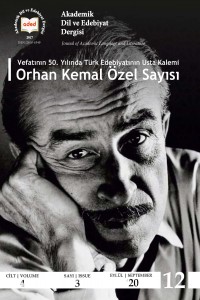Abstract
Keywords
References
- Öğütçü, I. (2016). Orhan Kemal, Unutulmuş Öyküler. İstanbul: Everest Yayınları. Aşkaroğlu, V. (2012). Günümüz Sıradan İnsanının Trajik Olgusu ve Kitabe-i Seng-i Mezar Şiirinde Süleyman Efendi Betimlemesinde Durumun İrdelenmesi. Dergi Karadeniz(16), 155-165. Aktaş, G. (2013). Feminist Söylemler Bağlamında Kadın Kimliği: Erkek Egemen Bir Toplumda Kadın Olmak. Hacettepe Üniversitesi Edebiyat Fakültesi Dergisi, 30(1), 53-72. Eliuz, Ü. (2008). Elif Şafak Anlatılarında Kadının Kimlik Sorgulaması. 1980 Sonrası Türk Romanı Sempozyumu. Trabzon: KTÜ. Eliuz, Ü. (2010). Orhan Kemal Romanlarında Kadının Nesne Olsrak Kullanımı: Cinsel Taciz. Sosyal Araştırmalar, 3(13), 96-103. İnceoğlu, Y., & Kar, A. (2010). Dişilik, Güzellik ve Şiddet Sarmalında Kadın ve Bedeni. İstanbul: Ayrıntı Yayınları. Uyguner, M. (2018). Orhan Kemal'in Öykücülüğü Üzerine. Türk Dili, Türk Öykücülüğü Özel Sayısı(286), 104-115. Uğurlu, N. (1972). Orhan Kemal'in İkbal Kahvesi. İstanbul: Örgün Yayınevi. Yılmaz, A. (2004). Toplumcu Gerçekçilik Bağlamında Orhan Kemal'in Hikâyeleri. Hece Öykü(4), 86-92.
Passive Appearance of "The Little Man" in The Early Period Stories By Orhan Kemal: Females Turned into Objects
Abstract
Orhan Kemal focuses on the Little Man that is at the center of the struggle for life in his narratives. The author is an observer in the adventures of people who spend their lives in an ongoing struggle. In addition to this, while making the narratives, he also makes use of his memoirs intensely.
The book "Orhan Kemal, Unutulmuş Öyküler", completed by the authorʹs son Işık Öğütçü in 2016, sheds light on the first years of Orhan Kemalʹs storytelling understanding. Fifty-four stories in the book bring the characteristics of the authorʹs early years in the literary adventure together with the readers. It can be said that in his stories, many of which will be added to his novels, Orhan Kemal put socialist realism in an original form with his own interpretation.
The female heroes in Orhan Kemalʹs early stories are often depicted as passive characters whose labor and body are exploited. Also, the female heroes that the author features while depicting the community defined as the little man determine the position they will take in Orhan Kemalʹs literary adventure from the first stories.
In this study, the stories written by Orhan Kemal using various pseudonyms, published in several journals and newspapers, will be discussed within the framework of the theme of woman in terms of objectification and exploitation. It will be examined within the framework of the stories of "Asma Çubuğu", "Güllü", "Vatana Dönüş", "Sevgili", "Küçücük" and "Birtakım Gençler", which sheds light on the early periods of Orhan Kemalʹs authorship. The theme of woman will be examined on the basis of some problems such as the passive role of the female characters belonging to the poor and low-income society layer in ʹthe home, work and society triangleʹ and their objectification and exploitation as an object in terms of benefiting from their body and labor.
References
- Öğütçü, I. (2016). Orhan Kemal, Unutulmuş Öyküler. İstanbul: Everest Yayınları. Aşkaroğlu, V. (2012). Günümüz Sıradan İnsanının Trajik Olgusu ve Kitabe-i Seng-i Mezar Şiirinde Süleyman Efendi Betimlemesinde Durumun İrdelenmesi. Dergi Karadeniz(16), 155-165. Aktaş, G. (2013). Feminist Söylemler Bağlamında Kadın Kimliği: Erkek Egemen Bir Toplumda Kadın Olmak. Hacettepe Üniversitesi Edebiyat Fakültesi Dergisi, 30(1), 53-72. Eliuz, Ü. (2008). Elif Şafak Anlatılarında Kadının Kimlik Sorgulaması. 1980 Sonrası Türk Romanı Sempozyumu. Trabzon: KTÜ. Eliuz, Ü. (2010). Orhan Kemal Romanlarında Kadının Nesne Olsrak Kullanımı: Cinsel Taciz. Sosyal Araştırmalar, 3(13), 96-103. İnceoğlu, Y., & Kar, A. (2010). Dişilik, Güzellik ve Şiddet Sarmalında Kadın ve Bedeni. İstanbul: Ayrıntı Yayınları. Uyguner, M. (2018). Orhan Kemal'in Öykücülüğü Üzerine. Türk Dili, Türk Öykücülüğü Özel Sayısı(286), 104-115. Uğurlu, N. (1972). Orhan Kemal'in İkbal Kahvesi. İstanbul: Örgün Yayınevi. Yılmaz, A. (2004). Toplumcu Gerçekçilik Bağlamında Orhan Kemal'in Hikâyeleri. Hece Öykü(4), 86-92.
Details
| Primary Language | Turkish |
|---|---|
| Subjects | Literary Studies |
| Journal Section | Articles |
| Authors | |
| Publication Date | September 11, 2020 |
| Submission Date | May 30, 2020 |
| Acceptance Date | July 26, 2020 |
| Published in Issue | Year 2020 Volume: 4 Issue: 3 |
This work is licensed under Attribution-NonCommercial 4.0 International


